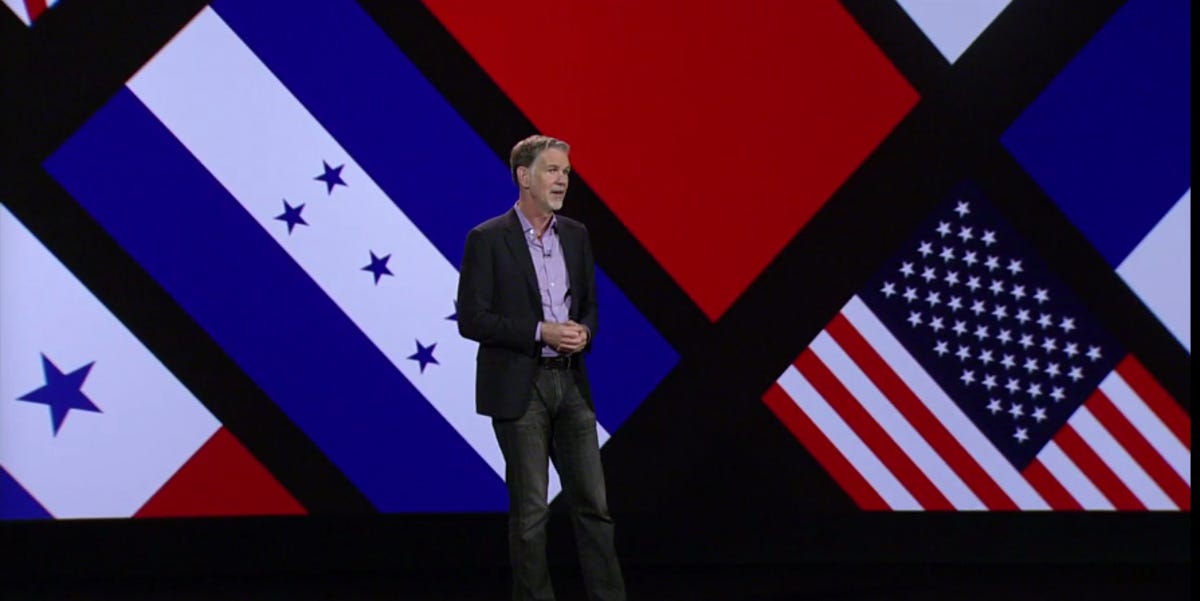This story is part of CES 2016. Our editors bring you complete CES 2016 coverage and scour the showroom floor for the hottest new tech gadgets around.
And just like that, Netflix is now available from Azerbaijan to Vietnam and just about every country in between.
Reed Hastings, CEO and co-founder of the video-streaming company, said Wednesday that Netflix has expanded to 130 more countries, growing to just about everywhere but China. The announcement marks a huge expansion for the company’s streaming service, which was previously available in 60 countries.
“Today, right now you are witnessing the birth of a global TV network,” he said onstage in Las Vegas during the Consumer Electronics Show.
The new countries include South Korea, India, Nigeria, Poland, Russia, Saudi Arabia and Singapore. Hastings said Netflix hopes to reach China in the future, as well, but offered no specific time frame.

Netflix CEO Reed Hastings addresses a CES crowd.
Netflix
The Los Gatos, California, company had already set a goal of reaching 200 countries by the end of this year, so Wednesday’s announcement comes as a surprise that Netflix was able to hit that milestone well ahead of time. Wall Street rewarded the company for the move by driving Netflix shares up about 6 percent.
“This is an amazing announcement,” said Jan Dawson, chief analyst at Jackdaw Research. “We’ve never had a paid video service that’s gone truly global before.”
International expansion has become a vital part of Netflix’s growth strategy, since growth in the US, its biggest market, has been slowing. Netflix currently has about 70 million subscribers worldwide, with more than half of them in the US. The company’s service has been a hit with consumers around the world, thanks to its strategy of coming to new countries with its growing menu of popular original content for a low monthly price.
China still remains a key market Netflix has yet to tap, despite the company’s continued mention of its interest in coming there. Netflix has previously said it would consider “modest” options to come to China, though still needs a license to operate in the country.
Netflix also won’t be available in Crimea, North Korea and Syria because of US government restrictions.
On top of the China holdup, Dawson noted that Netflix will likely face a lot of upfront costs from expanding to all those countries all at once.
While mostly available in English in most new countries, Netflix on Wednesday added Arabic, Korean, simplified and traditional Chinese to the 17 languages it already supports.
You can now watch Netflix in… South Korea, Afghanistan, Angola, Antarctica, Burkina Faso, Burundi, Benin…
— Netflix US (@netflix) January 6, 2016
Netflix has helped bring about a big shift in how and when we watch videos, resulting in more binge-watching of series and more people leaving their cable subscriptions for streaming services. Hoping to become a bigger fixture of your TV, Netflix is ramping up its list of feature-length films and growing its roster of original TV shows, such as its popular political thriller “House of Cards.”
Netflix also used the Wednesday presentation to show off trailers for new Netflix series coming this year, including “The Crown,” an story about Queen Elizabeth in the 1950s, and “The Get Down,” which is about the birth of disco and hip-hop in New York City.
Yet, as the company has grown, so has competition. Amazon and Hulu are fierce rivals, and Google is reportedly readying a push into premium content with its new subscription service, YouTube Red. With a variety of major competitors in streaming video, cable operators now face more threats to keeping their customers, but so does Netflix.
At last year’s CES, Netflix provided a much smaller announcement, coming out with the “Netflix Recommended TV” program. The new evaluation program was designed to help consumers choose smart TVs that offer better performance, easier menu navigation and new features that Netflix claims improve the Internet TV viewing experience.




